This post was originally published by The Online Citizen on 26 February 2018.
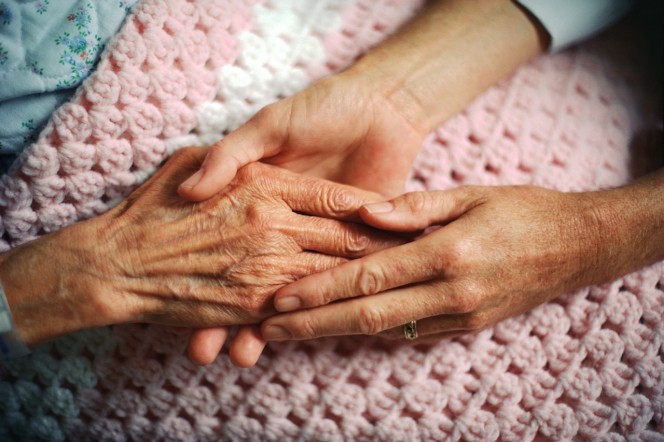 The word of the day was “innovation”, but this year’s Budget announcements by the Minister of Finance demonstrated few plans for change. Although the Government declared its commitment to address the needs of the ageing population by enhancing healthcare infrastructure, not much was said about tackling the rapidly growing impact of eldercare on families in Singapore.
The word of the day was “innovation”, but this year’s Budget announcements by the Minister of Finance demonstrated few plans for change. Although the Government declared its commitment to address the needs of the ageing population by enhancing healthcare infrastructure, not much was said about tackling the rapidly growing impact of eldercare on families in Singapore.
Firstly, the Government’s approach did not take into account the economic sacrifices that family members make to fill the gap of caregiving. Moreover, it also ignored how gender determines caregiving responsibilities, and financial adequacy.
Gender roles and expectations mean that caregiving work primarily falls on the women in the family. Last year, almost 300,000 women outside the labour force cited that their main reason for not working was because of family responsibilities, which include caregiving. According to an MSF survey on informal caregiving, 60% of caregivers of older people above 75 are women. Younger cohorts of women are pressured to drop out of the labour force to give care; they may also be dismissed for missing work due to caregiving duties, or unable to find work with flexible arrangements or eldercare leave. With comparatively lower average CPF balances than men have, women end up ageing into poverty at a higher rate than men do.
Leaving paid, formal work has an impact on all women – but it hits low-income families hardest, with the loss of income impacting their day-to-day lives almost immediately. Through AWARE’s own research into the impact of care on low-income women, we see the very visible struggles of women torn between giving care and finding economic security.
Wani (not her real name), a caregiver we spoke to, was going through a training course on professional eldercare – a chance for her to build on her own savings through stable employment – when her father-in-law experienced a stroke and became bedridden. She then became his primary informal caregiver, while also caring for her own parents, and her sister, who has Down’s Syndrome. Work opportunities that provide flexibility of leave never came (only 19.5% of employers surveyed by Ministry of Manpower offered paid parental care leave, and Singapore does not have legislated eldercare leave). So she remains unemployed and struggling to make ends meet.
She is among thousands of informal caregivers in Singapore, many of whom lack savings to begin with, who descend into ever more precarious economic woes as they grow older.
Unfortunately, much of the Budget’s talk on healthcare enhancements to address needs of older persons veers towards building more infrastructure, like hospitals, nursing homes and healthcare facilities. But caregiving is not merely about developing more facilities. Most caregiving work happens at home, and for many caregivers of older or disabled people, this includes showering, transferring, feeding, dressing, toileting and assisting the mobility of the care recipient – many times a day, every day. Oftentimes, such work requires more than one caregiver at a time.
Home-based caregiving is a physically and emotionally draining unpaid full-time job (sometimes, on top of formal full-time jobs). Knowledge of and access to all the support and healthcare services, respite care or private centres in Singapore are privileges many cannot afford due to lack of resources, including money, time, support networks, and sometimes, education.
The Budget’s announcement on enhancements to the Proximity Housing Grant shows some understanding that family members are often called upon to provide care, and living close to care recipients can facilitate this. But when the state expects family members to fill this role, how is it actually easing the care work itself, including its financial burden on caregivers?
The state can take more decisive steps to address how Singapore as a society will deal with the growing needs of our ageing population. They can alleviate the financial burden of unpaid caregiving – by providing family caregivers an allowance, and providing automatic basic contributions to individual CPF accounts that have low balances. This would allow family caregivers who are unable to engage in formal, paid employment to build CPF savings, which are critical for meeting basic needs, including housing, healthcare and financial resources for retirement.
For many time-stressed caregivers, including Wani, stable employment that allows them to manage their caregiving responsibilities while working would help to manage their conflicting demands. To address this, the Government can also introduce gender-neutral eldercare leave and incentivise employers to adopt flexible-working arrangements more widely.
Healthcare in old age could be made more affordable through an expansion of Silver Support to more individuals, and an expansion of the Pioneer Generation Package to all people on reaching 65 years of age. With secure access to healthcare, older persons would be able to participate fully in society, with the care burden on future generations of informal caregivers reduced.
We welcome the initiatives that the Government has so far introduced to support older people and family caregivers. But these initiatives should go further, and be part of a more comprehensive vision. The Government’s intention to finance social spending, on issues like the rapidly ageing population, through higher taxes is a step in the right direction, but doing so through a GST hike would hit poorer families hardest – a consequence we cannot ignore when making policies aimed to support vulnerable communities. If Singapore cares about its ageing population, let’s also ask: does Singapore care about its caregivers?
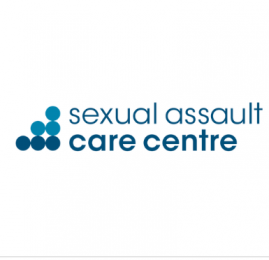 AWARE welcomes the move to amend the Criminal Procedure Code (CPC) and the Evidence Act to enhance protection for complainants of sexual and child abuse offences in investigative and court processes.
AWARE welcomes the move to amend the Criminal Procedure Code (CPC) and the Evidence Act to enhance protection for complainants of sexual and child abuse offences in investigative and court processes.




 The word of the day was “innovation”, but this year’s Budget announcements by the Minister of Finance demonstrated few plans for change. Although the Government declared its commitment to address the needs of the ageing population by enhancing healthcare infrastructure, not much was said about tackling the rapidly growing impact of eldercare on families in Singapore.
The word of the day was “innovation”, but this year’s Budget announcements by the Minister of Finance demonstrated few plans for change. Although the Government declared its commitment to address the needs of the ageing population by enhancing healthcare infrastructure, not much was said about tackling the rapidly growing impact of eldercare on families in Singapore. 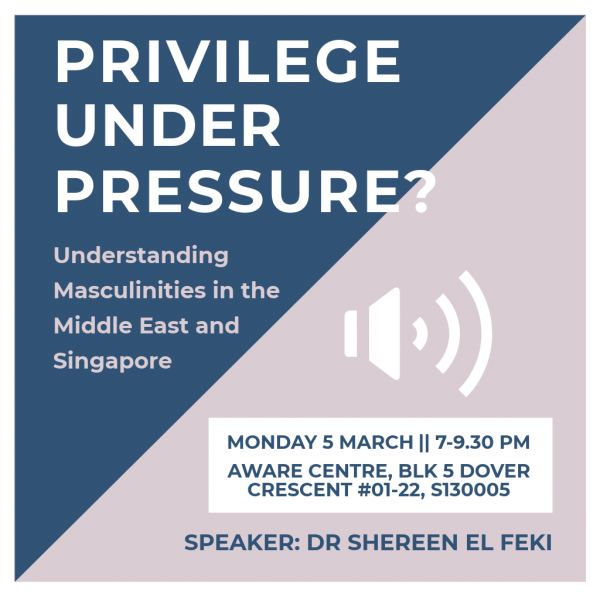 With shifts in global political and economic landscapes, how do men see their roles in the changing world around them, and the roles and rights of women and girls? Join our discussion of IMAGES MENA, the first study of its kind to explore the private and public lives of almost 10,000 men and women across the Middle East and North Africa.
With shifts in global political and economic landscapes, how do men see their roles in the changing world around them, and the roles and rights of women and girls? Join our discussion of IMAGES MENA, the first study of its kind to explore the private and public lives of almost 10,000 men and women across the Middle East and North Africa. Gender equality group AWARE (Association of Women for Action and Research) and disability advocacy group DPA (Disabled People’s Association) have called for stronger protection against employment discrimination in a joint submission to the public consultation on the Employment Act review.
Gender equality group AWARE (Association of Women for Action and Research) and disability advocacy group DPA (Disabled People’s Association) have called for stronger protection against employment discrimination in a joint submission to the public consultation on the Employment Act review.  The Association of Women for Action and Research (AWARE) welcomes the publication of data on household income in the newly released Singstat report. Detailed information enables the public to better take part in important conversations about national policy.
The Association of Women for Action and Research (AWARE) welcomes the publication of data on household income in the newly released Singstat report. Detailed information enables the public to better take part in important conversations about national policy.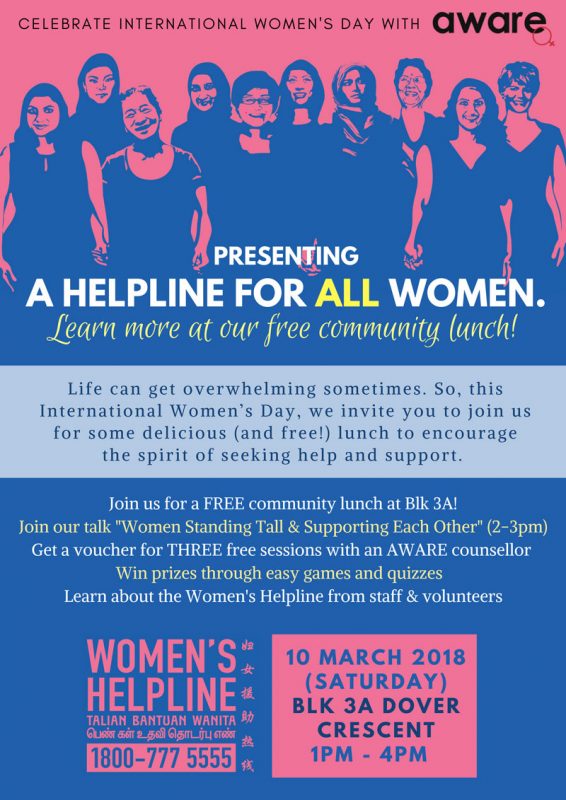
 Hear Kim Underhill, President of Daughters Of Tomorrow (DOT), share her own experiences with seeking support as a survivor of domestic violence and as a single parent. Kim Underhill is a highly engaged member in both business and women’s empowerment communities. She now shares her vast experience through keynote speaking, management consulting, coaching, and learning and development programmes, helping individuals and businesses alike see the intrinsic potential in themselves and their people.
Hear Kim Underhill, President of Daughters Of Tomorrow (DOT), share her own experiences with seeking support as a survivor of domestic violence and as a single parent. Kim Underhill is a highly engaged member in both business and women’s empowerment communities. She now shares her vast experience through keynote speaking, management consulting, coaching, and learning and development programmes, helping individuals and businesses alike see the intrinsic potential in themselves and their people.

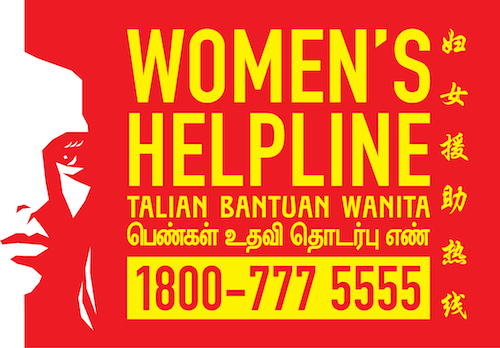 Our Women’s Helpline service will be operating from 3-6pm only on Chinese New Year Eve (15 Feb) and will be closed over Chinese New Year (16 Feb).
Our Women’s Helpline service will be operating from 3-6pm only on Chinese New Year Eve (15 Feb) and will be closed over Chinese New Year (16 Feb).